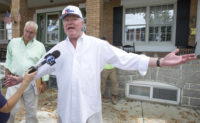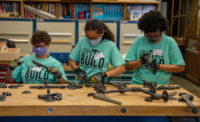The accused cultivated and exploited Local 401’s reputation for violence, according to the indictment.
The defendants and their associates had a network of union members, associates, members of other unions and people friendly with Local 401 who identified construction projects that failed to use members for ironworking tasks.
Network members would contact the Local 401 union hall or one of its business agents to inform them of the project, according to the U.S. attorney.
After a project was identified, one of the union’s business agents would approach the foreman on the project and implicitly or explicitly threaten him with violence, destruction of property or other crimes, if the contractor didn’t hire Local 401 members, the indictment claims.
Usually, Local 401 required that half of the workers on a project be its members, and in some cases, all of the workers.
“The defendants and their associates relied heavily on a well-earned reputation for violence and sabotage which had been built up in the community over many years, to force contractors to hire members of Ironworkers' Local 401,” the indictment states.
Sometimes the union would use picket lines to coerce contractors, said the indictment. At times the lines were lawful, and other times they blocked non-union contractors from delivering materials and non-union employees to the jobsite.
Union-appointed thugs also would assault non-union employees with baseball bats, slash tires of vehicles, smash vehicles with crowbars, cut and change locks on construction sites or fill them with superglue, damage construction equipment, steal construction materials and otherwise sabotage the construction site.
When such tactics didn’t work, the defendants and their associates would commit arson and damage property under construction.
Those actions included setting fire to the construction site and equipment using a Local 401 acetylene torch, according to the indictment, and using the torch to cut support columns from a building under construction.





Post a comment to this article
Report Abusive Comment